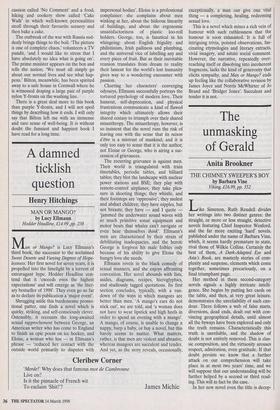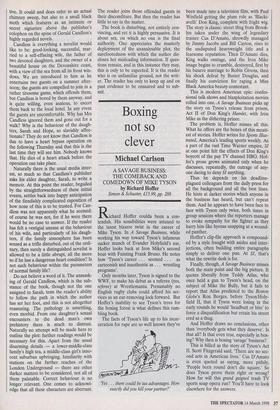The unmasking of Gerald
Anita Brookner
THE CHIMNEY SWEEPER'S BOY by Barbara Vine Viking, £16.99, pp. 352 Like Simenon, Ruth Rendell divides her writings into two distinct genres: the straight, or more or less straight, detective novels featuring Chief Inspector Wexford, and the far more exciting 'hard' novels, published under the name of Barbara Vine, which, it seems hardly premature to state, rival those of Wilkie Collins. Certainly the best of them, A Dark-Adapted Eye and Asta's Book, are masterly stories of com- plexity and suspense, elements which come together, sometimes precariously, on a final triumphant page.
Her method in these second-category novels signals a highly intricate intelli- gence. She begins by putting her cards on the table, and then, at very great leisure, demonstrates the unreliability of such can- dour. There follows a web of false starts, diversions, dead ends, dealt out with con- vincing geographical details, until almost all the byways have been explored and only the truth remains. Characteristically this truth is unreliable, and the shadow of doubt is not entirely removed. This is clas- sic composition, and the virtuosity arouses respect, admiration, even gratitude. If that doubt persists we know that a further attack on our comprehension will take place in at most two years' time, and we will suppose that our understanding will be further helped by a second or third read- ing. This will in fact be the case.
In her new novel even the title is decep- tive. It could and does refer to an actual chimney sweep, but also to a small black moth which features as an intimate or secret signature above the publisher's colophon on the spine of Gerald Candless's highly regarded novels. Candless is everything a novelist would like to be: good-looking, successful, mar- ried to a self-effacing wife, the father of two devoted daughters, and the owner of a beautiful house on the Devonshire coast, with a view of the sea from all its front win- dows. We are introduced to him as he entertains two guests on a summer after- noon; the guests are compelled to join in a rather tiresome game, which offends them, but Candless is bored by them anyway, and is quite willing, even anxious, to escort them back to the local hotel. In any event the guests are uncomfortable. Why has Mrs Candless ignored them and gone out for a walk? Why is the behaviour of the daugh- ters, Sarah and Hope, so slavishly affec- tionate? They do not know that Candless is due to have a heart bypass operation on the following Thursday and that this is the last time they will see him. Nobody knows that. He dies of a heart attack before the operation can take place. Naturally there is the usual media inter- est, so much so that Candless's publisher asks his elder daughter, Sarah, to write a memoir. At this point the reader, beguiled by the straightforwardness of these initial events, settles back into happy anticipation of the fiendishly complicated exposition of how none of this is to be trusted. For Can- dless was not apparently what he seemed: of course he was not, for if he were there would be no case to answer. If the reader has felt a vestigial unease at the behaviour of his wife, and particularly of his daugh- ters, if the family atmosphere has been sensed as a trifle disturbed, out of the ordi- nary, then surely a distinguished novelist is allowed to be a little abrupt, all the more so if he has a dangerous heart condition? Is not such behaviour within the parameters of normal family life?
Do not believe a word of it. The unmask- ing of Gerald Candless, which is the sub- stance of the book, though not the one assigned to Sarah, tests the reader's ability to follow the path in which the author has set her foot, and this is not altogether reassuring. The pathology is unsettling, even morbid. From one daughter's sexual encounters to the dead man's own prehistory there is much to distrust. Naturally no attempt will be made here to outline the plot: further readings would be necessary for this. Apart from the usual disarming details — a lower-middle-class family's high tea, a middle-class girl's inno- cent suburban upbringing, familiarity with stations on the farther reaches of the London Underground — there are other darker matters to be considered, not all of them palatable. Correct behaviour is no longer relevant. One comes to acknowl- edge that all these characters are aberrant. The reader joins those offended guests in their discomfiture. But then the reader has little to say in the matter.
The book is disturbing, not entirely con- vincing, and yet it is highly persuasive. It is about sex, on which no one is the final authority. One appreciates the masterly deployment of the unanalysable plot, the surefootedness with which the author dis- closes her misleading information. If ques- tions remain, and in this instance they may, this is only to be expected. It is the reader who is on unfamiliar ground, not the writ- er. The reader has only to keep up and on past evidence to be ensnared and to sub- mit.



































































 Previous page
Previous page